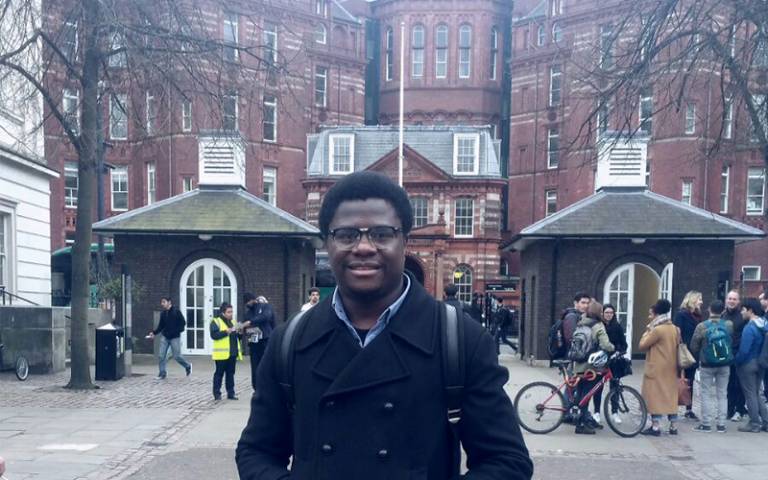Student Spotlight: Anthony, MSc Global Health and Development
30 May 2017
We speak to Anthony, MSc Global Health and Development student, about his background, career goals, and why he chose to study the programme.

What attracted you to study Global Health and Development at UCL?
I became interested in exploring global health issues during the recent Ebola Virus Disease (EVD) outbreak in West Africa, which claimed the lives or more than 11300 people in Sierra Leone, Guinea, and Liberia. The outbreak clearly highlighted the weaknesses and limitations of the healthcare systems in these countries. Having had first-hand experience working on various health-related interventions in my country (Sierra Leone), I wanted to broaden my knowledge on contemporary issues in health from a global development perspective.
The MSc Global Health and Development Programme at UCL’s Institute for Global Health stood out distinctively in my course options due to its unique interdisciplinary content. Given my research background, I had a desire to not only understand global health concepts, controversies, and systems, but also to delve into various measurement methods and techniques relevant to evaluating health interventions and formulating health policy. The course design created the flexibility to select modules that satisfied my interests in management and planning, governance and politics and health economics. Furthermore, UCL is a leading university that prides itself on optimal standards of academic excellence and diversity. To meet my academic interests and at the same time have an opportunity to interact academically with like-minded individuals from across the world and some of the top intellectuals involved in this kind of work, I knew that UCL was the place for me.
What are your future goals post-graduation?
I had always wanted to be of service to my country and contribute to its development. Even as we try to recover from the social and economic loss as a result of the Ebola outbreak, my country will need development practitioners that are grounded in global health concepts. Upon completing this programme, I am hoping that I will be equipped with the relevant knowledge to better understand the challenges faced by Sierra Leone's healthcare system and their possible remedies from a development perspective. I look forward to going back to Sierra Leone to work in health policy units either within the government or relevant non-profit organisations. This MSc has been an excellent base to fulfil this dream.
What do you like about your programme and why?
Firstly, this programme offers modules that cut across multiple disciplines with the specific focus on how they determine or shape global health outcomes. The programme’s interdisciplinary nature has forged my understanding of complex issues from the different philosophical point of views. Secondly, I enjoy the learning process which is a combination of lectures, seminars and workshops that create a relaxed atmosphere for every student to explore their academic curiosity and at the same time contribute to knowledge through expressing thoughts and sharing experiences. Thirdly, I like the support I receive from both academic and administrative staff with their invaluable advice on my studies, career options and even personal issues when needed. The overwhelming learning materials provided fascinate me, but more importantly, has made my life very easy. Finally, I can proudly say I have made friends from across the world, whom I believe will forever form part of my social and professional network.
What can a student expect to learn on this course?
A student on this course will learn contemporary issues in global health, understanding evidence in global health, health systems and the power and political dynamics in global health. You can choose from a variety of optional modules from various disciplines based on your specific interests. More importantly, you learn both hard and soft skills that will be quite handy in your professional life. This course will make you an expert in global health practice in every political, socio-economic, and geographical context.
What were you doing before you became a student at UCL?
Six years prior to 2016, I was working for a non-profit research organisation called Innovations for Poverty Action (IPA). IPA brings together researchers and decision-makers to design, rigorously evaluate, and refine interventions that reduce poverty and improve other development indicators. In my capacity as a Senior Research Associate, I was involved in multiple health-related research ventures and other social evaluations aimed at informing policy in Sierra Leone, Liberia, and Ghana. I also played a key role in staff development, management, and stakeholder engagement.
What piece of advice would you give to new students?
I must say that the rich content and pace of this course could be overwhelming, but in general quite manageable. If you want to get the best out of this course, be sure to attend every lecture, tutorial, seminar, or workshop and meet every deadline for your assessments. Nonetheless, make a conscious effort to make new friends, take advantage of every opportunity to network and don’t forget to explore the beautiful city of London.
Where do you identify as home?
Sierra Leone (the land of the free).
 Close
Close

